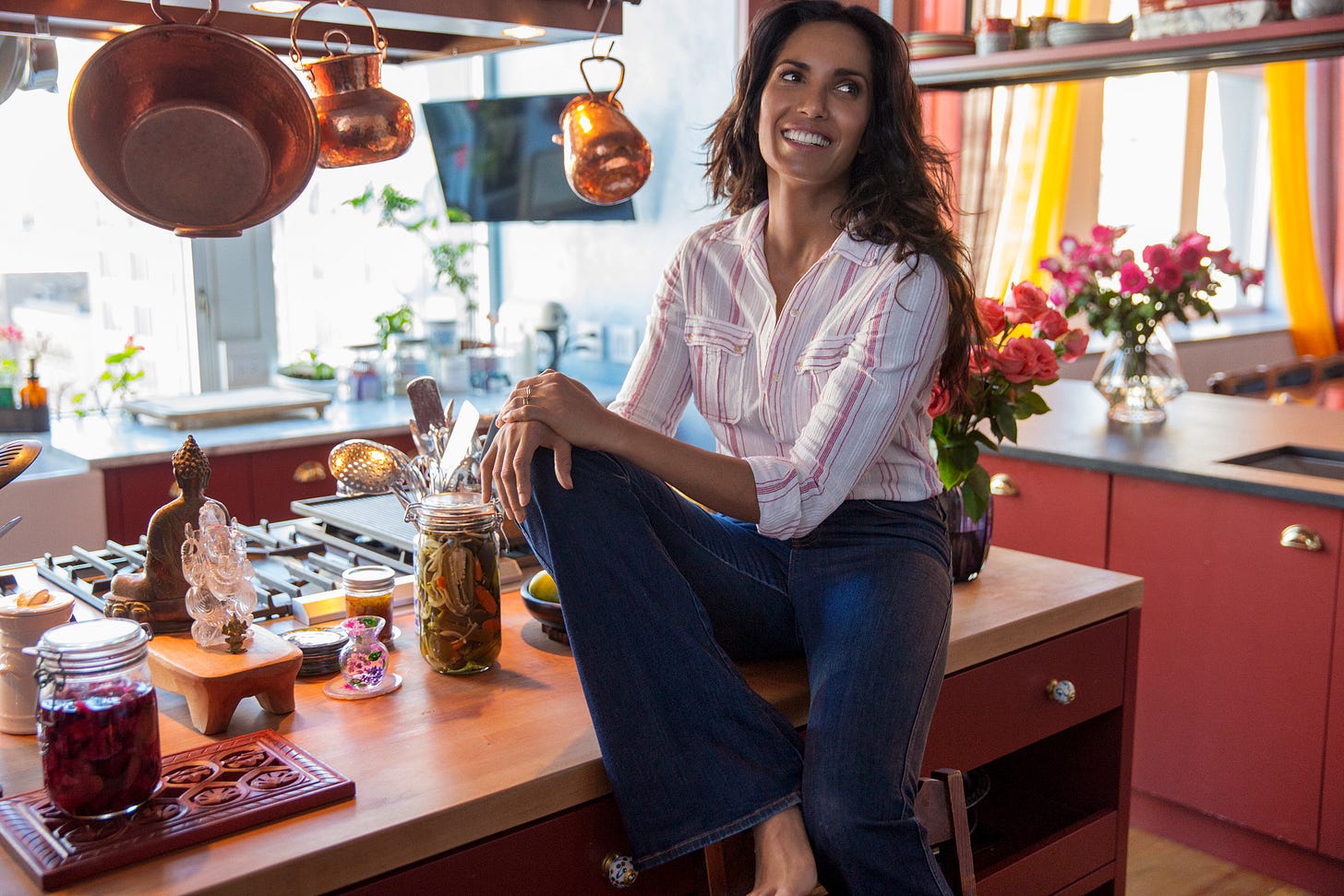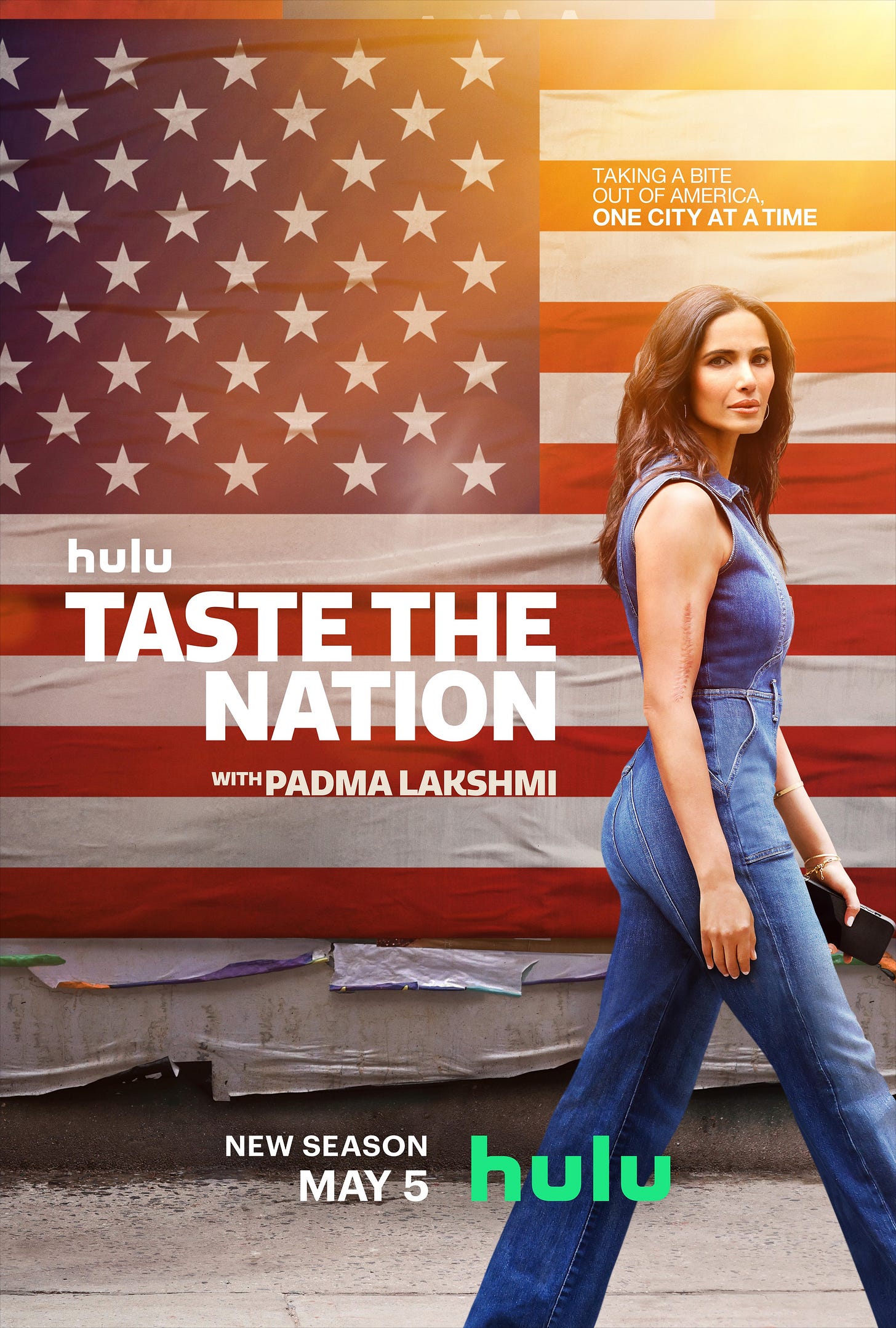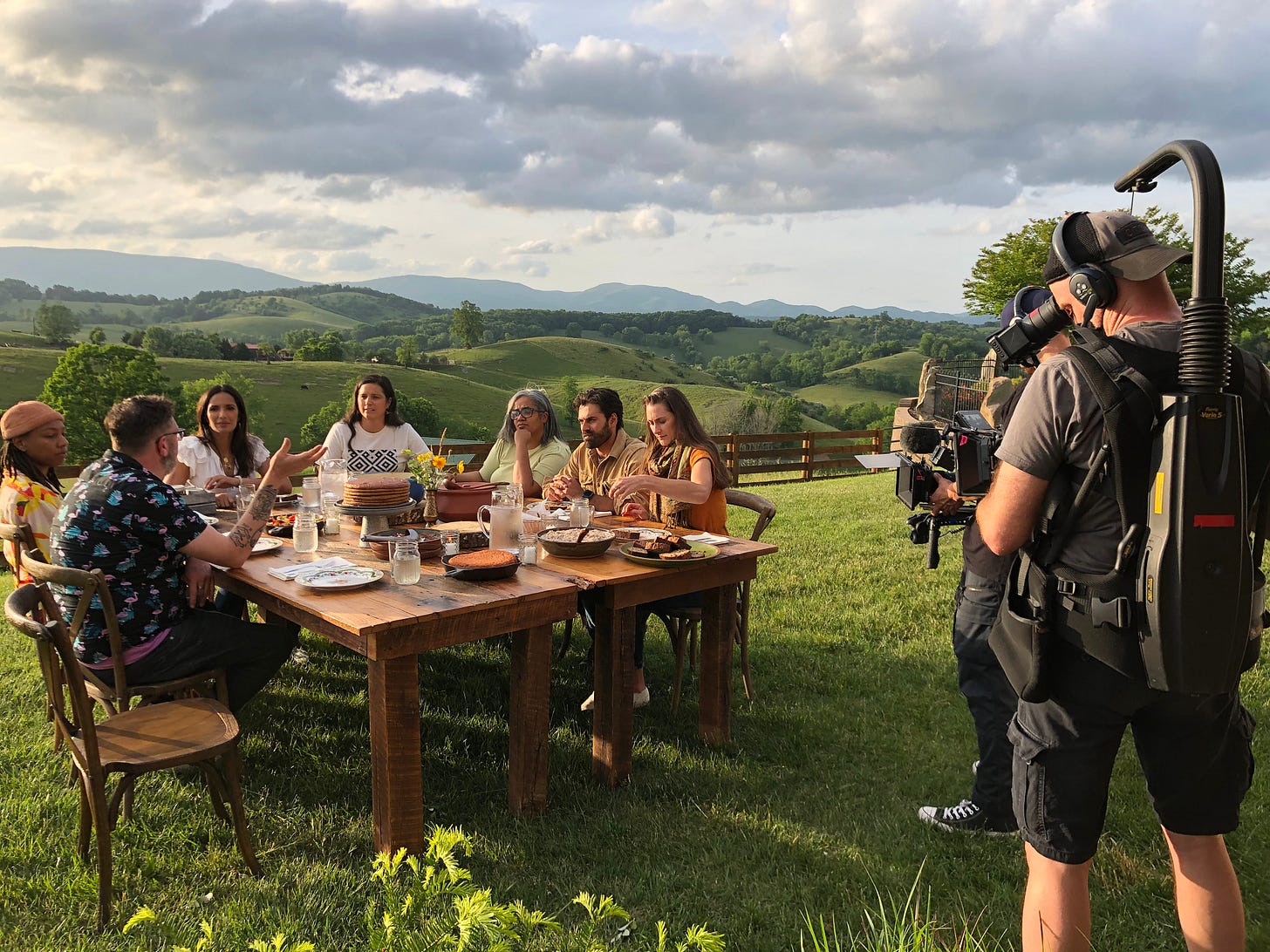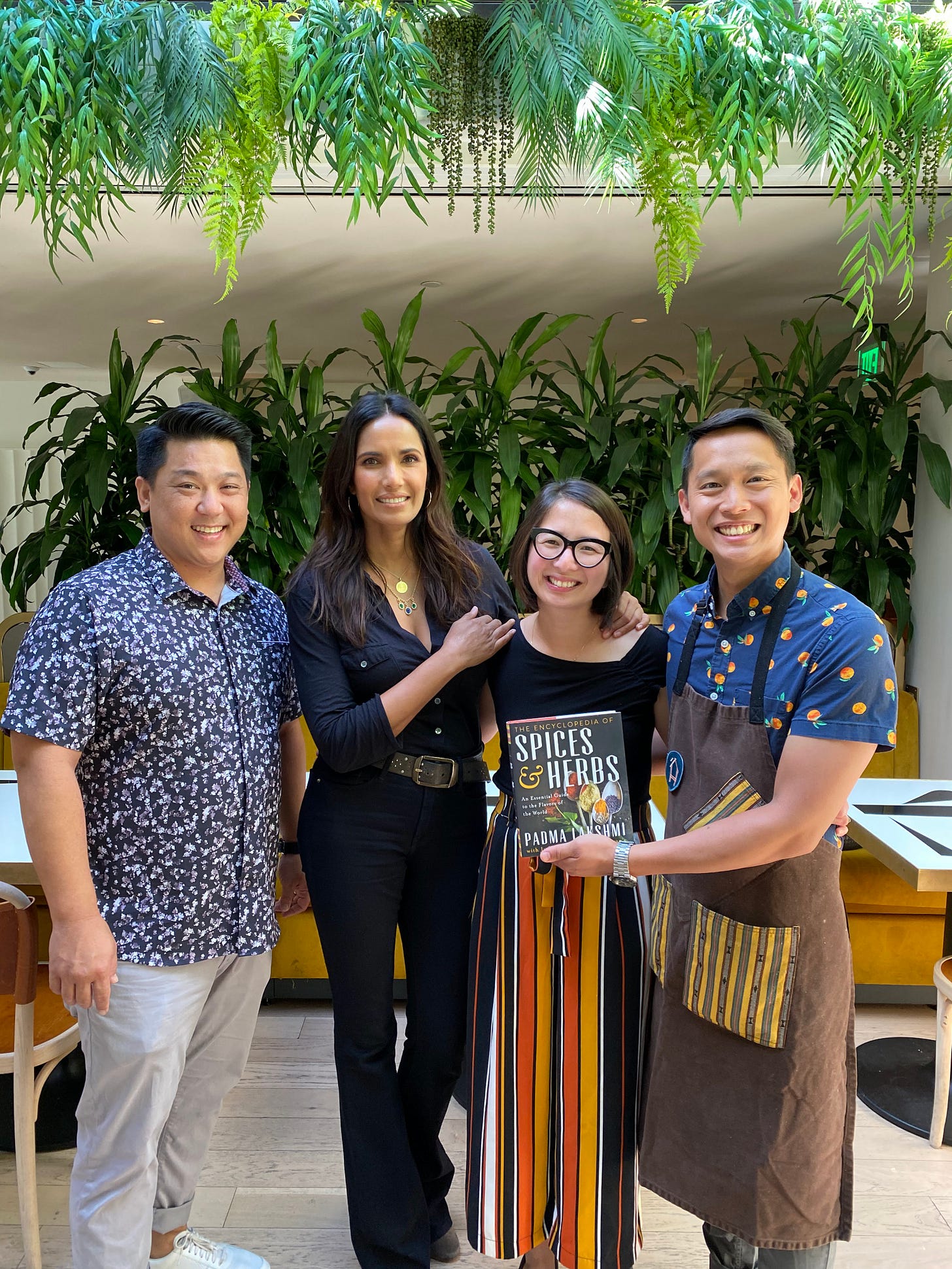Renegades Issue: Padma Lakshmi (Executive Producer, Host)
Spotlighting food and culture from the chef's table to immigrant communities
Padma Lakshmi
Model, TV Host, Author
Executive Producer, Taste the Nation
Welcome to Renegades, a series spotlighting Asian Pacific leaders and creatives who are carving their own paths and defying stereotypes along the way.
This week, we’re featuring Padma Lakshmi, a model, television host, author, and executive producer. Padma shares with us the lessons she learned while on Top Chef, how her advocacy work with the ACLU prompted the creation of her Emmy-nominated docuseries, Taste the Nation, and where the series could go beyond the United States toward issues of global migration. If you haven’t already watched the newest season of Taste the Nation, watch HERE on Hulu.
What did you want to be when you were growing up, and how does that compare to what you do today?
The first job I wanted was to be a flight attendant. My first flight was from New Delhi to New York at age four, and I remember how beautiful and free those women in their printed silk sarees looked, flitting about from port to port in airports with their matching cases. They traveled where they wanted and got to see the world. It’s not so different than what I do now after all [with] filming Taste the Nation. Instead of serving folks tea, coffee, and their meal trays, I’m cooking with folks and getting to know them through food!! LOL.
You began a career in modeling before pivoting into hosting, judging, and executive producing food series, such as Top Chef and Taste the Nation. What motivated you to switch from the fashion industry to television and food?
I’ve always been interested in food. I just didn’t know one could have a career in it outside of being a chef. I didn’t grow up in the food world, but I did grow up in a family of great cooks. I suppose at some point I wanted to do something in front of the camera besides just pose in frocks. And food seemed as good as any other activity since I was doing it on my own time anyway.
As the long-time host of Top Chef, what are some lessons you learned throughout your tenure, and why is now the right time to leave?
Top Chef was a wonderful place for me to learn so much, and not only about food. It’s quite psychological really. People’s insecurities come out, just in the moment when they’re trying to do their best at what they love. I became so emotionally attached to each batch of contestants, and I loved playing in that kitchen. It’s so much more intimidating than on television. I really felt for our chefs. I learned how to manage egos at the judges’ table, [and] that my opinion as a judge at times mattered less than my duties as host. I learned not to take things personally, which was hard at times; I learned that there is always editing; [a]nd I believe I learned a good measure of empathy for all our guests and participants.
Your docuseries, Taste the Nation, explores food and culture of immigrant and indigenous communities across the US. How did you come up with this concept?
I wanted to find a way to dovetail my advocacy work on immigration rights for the American Civil Liberties Union (ACLU) into an artistic project I could work on professionally. I’ve always been interested in the intersection of two cultures bumping up against each other, [a]nd I’m an immigrant myself. I’d seen how our communities were vilified during the 2016 election and beyond. I wanted to counter that.
I also knew that America in its current form would not be possible without the constant influx of new generations of immigrants from all over the world. These new Americans interested me and so did their foods. My cookbooks have always reflected food from around the world, not just Indian or South Asian cuisines. So, I felt this was an interesting way to look at culture in America—through the [lens of] food. It was hard at first to communicate what I had in mind to potential buyers. Luckily, Hulu saw my vision and supported it.
Congratulations to Taste the Nation for earning an Emmy nomination! What is your vision for future iterations of the docuseries to impact the food and restaurant space?
We are at such an inflection point in our society. All over the world, there is more migration than ever before. There was just a great piece in the New York Times about this [topic this] morning in fact. I think, as a show, we need to cover all of this. Our show is a food show, but it’s also political and of the moment. I think a natural progression for us would be to go international and see how all this migration plays out around the globe.
This season, Taste the Nation spotlights Filipino and Cambodian food and culture. What made these two Southeast Asian cuisines in their respective cities stand out?
I felt that since we [had] covered Chinese, Japanese, Indian, and Korean food and culture between season one and the Holiday Edition, we needed to represent other Asian voices that [do not receive] enough mainstream attention. That’s also a big part of Taste the Nation. We always want to make sure we are giving our platform to those not usually in the limelight. Not only out of a desire to right the wrongs we’ve seen and experienced firsthand as Asian creators of television, but [also] because I believe that makes for a more interesting show.
Cambodian culture and cuisine were always so fascinating to me, [even though] I didn’t know much about it, [but] I wanted to. I suspected others would find it interesting too. Whereas, I did grow up around Filipino culture, on both coasts. My closest friends growing up were often Filipino. I’d never seen this community get the attention I thought they deserved, so I wanted to change that. Much of Taste the Nation is so personal to me, my producers, and the participants we feature. The show is reflective of that personal perspective, I hope!
Out of all the Taste the Nation episodes you’ve worked on, which one has been the most surprising or rewarding to you?
I’m always on some journey of learning in all these episodes. I am humbled by how much I’ve had to learn on the job [at] Taste the Nation. Not only about the craft of television and specifically documentary filmmaking, but [also] about the complex history of these vast cultures and the US.
I have learned the most from our African American episodes (Gullah Geechee and Nigerian) as well as our indigenous episodes (Arizona, El Paso, Wampanoag, and Appalachia). These have taught me how interconnected the various communities in America are. We will be stronger as a nation if we look clear-eyed at our history—even the painful parts of internment, enslavement, and genocide—so that we do not repeat the horrors of the past. [We] can begin to atone and heal from them, even if we are just inheritors of those legacies’ problems. It’s a tough topic, but if we don’t contend with this, our children will be doomed to be mired by the same.
As an author, you’ve published two cookbooks, an encyclopedia, a memoir, a children’s book, and a compilation of essays from travel writers. What goes into your writing process?
I generally like to write in the morning, first thing just after a cup of tea. I do go back throughout the day, but those first 3-4 hours in the morning are critical. I like to be alone, in silence, without the internet to distract me, though at times I need it for research of course. [Afterwards], I try and take a break, and […] perhaps read something related to the task at hand. Then, [I’ll] go back for an hour or two, and check my work and revise at night after dinner for an hour.
It’s a constant struggle to stay in the mental zone one needs to focus and concentrate. It’s often just about clearing the decks and waiting at your desk for something you’re scratching at, to move closer to. The project dictates the process a lot. Cookbooks [were] the most work. The encyclopedia [was] daunting in its research elements, and the literary criticism [was] the most frightening to me. The memoir was hard in an existential way but also in the technical writing of it. There were years when I never knew if I’d even have a coherent book. All writing is tough. You really must want to do it. Friends and editors can help you, but in the end, it’s always you alone against the page.
Beyond the culinary world, you’re also an advocate for diversity and inclusion and speak out on political issues. How do you deal with those who push back or tell you that politics are not your forté?
I ignore them. If I just stuck to my lane— whatever people thought that was—all along, I wouldn’t be where I am today. You can’t please everyone. You must only please your conscience and sense of self-worth, and curiosity of course.
What are you currently working on that’s exciting you the most?
I’m currently working on the Taste the Nation cookbook. We are exactly in the middle of testing recipes and gathering others not featured in the show, but also putting them all through the filter of my own palate. It’s a big project, but the show started out as a cookbook project. Then, I showed the proposal to my producing partner, David, and he thought we should meld that with another immigrant show idea we were working on. Now, I need to go back to do the actual book!
Lightning Round
Daily Habit
A cup of tea before all elseMost Productive Time of Day
Morning or late at nightFavorite City to Visit
ParisBest Culinary Tip
It’s about the people, not the food! But plan a menu you can mostly do ahead for ease.Comfort Food
Rice and dalFavorite Book
The Art of Eating by MFK Fisher








